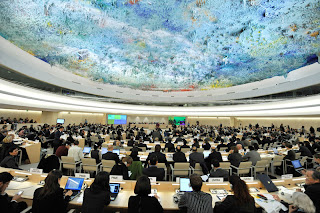| Look at that face. Look how benevolent he looks. |
As world leaders including Pres. Obama streamed into Riyadh
this weekend to pay their respects to the late Saudi King Abdullah bin
Abdulaziz, the obituaries and op-eds that emerged painted two very different
pictures of the deceased monarch. On the one hand, world leaders and some
foreign policy analysts called the king a reformer who sought “discreet”
changes for women including a pledge to allow them to vote and run in 2015
municipal elections, and who sought “stability” in the region as a whole. In
such analyses, Abdullah was a benevolent dictator whose moderate policies
struggled to find a place in a conservative society.
On the other, Abdullah’s less-publicized regressive policies
come to the fore as examples of his autocratic tendencies and refusal to make
real changes in the lives of most Saudi citizens. Despite some advances for
women during his rule, his policies towards female rights and activism remained
woefully medieval. Four of his 15 (or so) daughters have been held under house
arrest since 2002 for speaking out about the deplorable state of women’s
rights in the Kingdom. Women continued to be prosecuted and cruelly punished
for personal indiscretions such as (alleged) adultery, divorce, and even having
a boyfriend.
The country’s large population of foreign domestic workers and stateless people
enjoy virtually no rights, and yet are often held to account under Saudi law by
the regressive justice system that is almost certain to find them guilty of
alleged crimes. Countless activists, bloggers, human rights lawyers, LGBT
citizens, and stateless people have been arbitrarily detained, tortured, and
executed in brutal fashions (although one could argue that all execution is
brutal) under Abdullah’s rule. While Abdullah’s publicists did a very good job
lauding his “reformist” policies, surely the examples to the contrary outweigh
his supposed reforms, many of which were largely window dressing on a dictatorship
that insists on the suppression of any hint of dissent.








